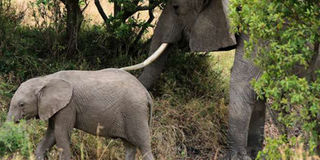Let’s save the environment, save man

Elephants grazing at Mara North Conservancy in Kenya on September 16, 2016. Kenya is home to some of Africa’s most magnificent conservancies and spectacular wildlife. PHOTO | JEFF ANGOTE | NATION MEDIA GROUP
What you need to know:
- I try to reassure them. I remind them that Kenya is a leader in conservation on this continent, so such a future should be unimaginable.
- Environmental crime is now the fourth largest criminal enterprise globally, rising by 5 to 7 per cent annually.
- The illegal dumping of waste can contaminate the soil and water for those who live near illegal dumpsites.
I was raised on the foothills of Mount Kilimanjaro. Every night I was lulled to sleep by the sound of the streams flowing down the mountain’s slopes to our banana garden in the backyard.
This water irrigated my grandmother’s crops, and those of the entire village.
As I grew older I would walk alone from school the few kilometres to our house, often breathless from the altitude, but comforted by the soft gurgle of those streams accompanying me on my journey. It was home then.
In 1985 I returned to the village with my new husband to spend our first few weeks of marriage with my family.
As I lay in bed at night, although familiar, I found little comfort in the chirping of crickets, for there was no soothing sound of meandering water.
The streams had dried up. Now those villagers dig trenches and pray for the rain their crops now depend on.
This is just one of many changes to the landscape I have witnessed over the past few decades.
With each change I see the lives of people altered in ways that were unimaginable to me as a girl.
My own children grew up in Kenya. They find the sight of elephants and flamingos as comforting as I found the sound of those babbling brooks.
But they worry. They see fewer elephants and rhinos. They read the headlines and they know there is a crisis.
They wonder aloud what these landscapes will look like in 20 years.
I try to reassure them. I remind them that Kenya is a leader in conservation on this continent, so such a future should be unimaginable.
It is home to some of Africa’s most magnificent conservancies, courageous rangers, spectacular wildlife, and diverse habitats and landscapes.
ENVIRONMENTAL CRIME
As a country, Kenya is a pulsating homage to nature, deserving of our care and respect.
But it is a respect we pay on the one hand and withhold on the other.
We know that many of our species are threatened by environmental crime and habitat destruction.
We know there are now more people cultivating less land.
We know the climate is changing and with it the seasons.
And we know that if left unaddressed, things are going to get worse before they get better for our children.
That is why conventions are so critical to conserving the precious natural resources we have left.
This week Kenya, along with over 180 other countries, will take decisions that will affect thousands of species of plants and animals.
The Convention on International Trade in Endangered Species of Wild Fauna and Flora is one of the ways in which governments attempt to protect our biodiversity.
And it is a protection we offer against a rising tide of threats.
Environmental crime is now the fourth largest criminal enterprise globally, rising by 5 to 7 per cent annually.
In Africa it is most commonly associated with poaching of elephants and rhinos for their tusks and horn.
But the reach of environmental crime goes much farther.
Did you know that between 30 and 50 per cent of the global water supply is illegally purchased?
If you live in Kibera you may be paying more for water during periods of shortage than someone living in New York.
FINDING SOLUTIONS
Any time a natural resource is stolen because the law is not upheld or enforced, or because the law simply does not exist in a form designed to protect that resource, people pay the price.
Environmental crime robs governments of much-needed revenues, people of livelihoods, peace and security.
The illegal dumping of waste can contaminate the soil and water for those who live near illegal dumpsites.
Demand for charcoal is expected to triple in the coming three decades, driving deforestation and contributing to an air pollution crisis that is already killing around seven million people globally every year.
Illegal mining takes place without licences, in prohibited zones, and is characterised by poor working conditions and significant threats to workers’ health.
And illegal fishing denies legitimate fishermen food and income for their families.
A new report will be released by UN Environment and Interpol this week that reveals how serious a threat environmental crime is becoming and what we can do to tackle it.
We must start to take environmental crime seriously because for every resource stolen there is a little less to go around.
It is not just about saving iconic animal species. It is about saving the human species from lives marked by degradation and indignity.
The writer is the director of UN Environment’s Law Division. [email protected]




